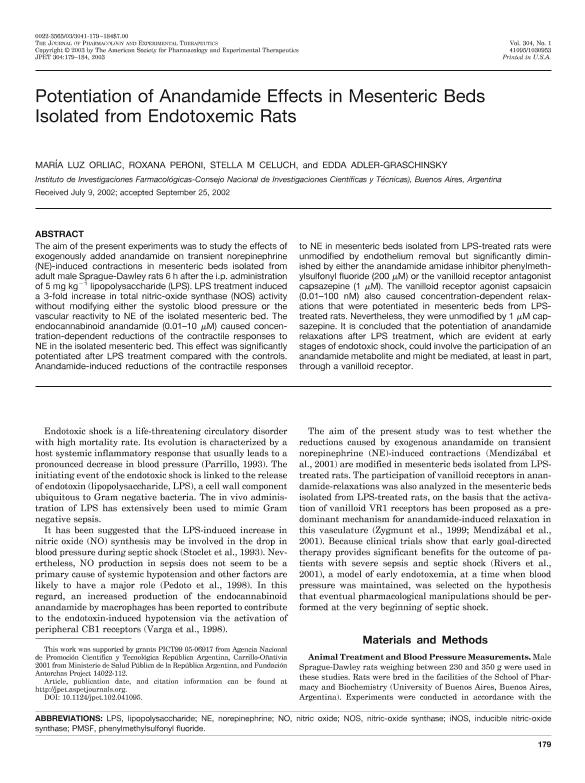Mostrar el registro sencillo del ítem
dc.contributor.author
Orliac, Maria Luz

dc.contributor.author
Peroni, Roxana Noemi

dc.contributor.author
Celuch, Stella Maris

dc.contributor.author
Adler, Edda

dc.date.available
2020-03-12T19:26:31Z
dc.date.issued
2003-01
dc.identifier.citation
Orliac, Maria Luz; Peroni, Roxana Noemi; Celuch, Stella Maris; Adler, Edda; Potentiation of anandamide effects in mesenteric beds isolated from endotoxemic rats; American Society for Pharmacology and Experimental Therapeutics; Journal of Pharmacology and Experimental Therapeutics; 304; 1; 1-2003; 179-184
dc.identifier.issn
0022-3565
dc.identifier.uri
http://hdl.handle.net/11336/99325
dc.description.abstract
The aim of the present experiments was to study the effects of exogenously added anandamide on transient norepinephrine (NE)-induced contractions in mesenteric beds isolated from adult male Sprague-Dawley rats 6 h after the i.p. administration of 5 mg kg-1 lipopolysaccharide (LPS). LPS treatment induced a 3-fold increase in total nitric-oxide synthase (NOS) activity without modifying either the systolic blood pressure or the vascular reactivity to NE of the isolated mesenteric bed. The endocannabinoid anandamide (0.01-10 μM) caused concentration-dependent reductions of the contractile responses to NE in the isolated mesenteric bed. This effect was significantly potentiated after LPS treatment compared with the controls. Anandamide-induced reductions of the contractile responses to NE in mesenteric beds isolated from LPS-treated rats were unmodified by endothelium removal but significantly diminished by either the anandamide amidase inhibitor phenylmethylsulfonyl fluoride (200 μM) or the vanilloid receptor antagonist capsazepine (1 μM). The vanilloid receptor agonist capsaicin (0.01-100 nM) also caused concentration-dependent relaxations that were potentiated in mesenteric beds from LPS-treated rats. Nevertheless, they were unmodified by 1 μM capsazepine. It is concluded that the potentiation of anandamide relaxations after LPS treatment, which are evident at early stages of endotoxic shock, could involve the participation of an anandamide metabolite and might be mediated, at least in part, through a vanilloid receptor.
dc.format
application/pdf
dc.language.iso
eng
dc.publisher
American Society for Pharmacology and Experimental Therapeutics

dc.rights
info:eu-repo/semantics/openAccess
dc.rights.uri
https://creativecommons.org/licenses/by-nc-sa/2.5/ar/
dc.subject.classification
Farmacología y Farmacia

dc.subject.classification
Medicina Básica

dc.subject.classification
CIENCIAS MÉDICAS Y DE LA SALUD

dc.title
Potentiation of anandamide effects in mesenteric beds isolated from endotoxemic rats
dc.type
info:eu-repo/semantics/article
dc.type
info:ar-repo/semantics/artículo
dc.type
info:eu-repo/semantics/publishedVersion
dc.date.updated
2019-11-25T17:46:54Z
dc.journal.volume
304
dc.journal.number
1
dc.journal.pagination
179-184
dc.journal.pais
Estados Unidos

dc.journal.ciudad
Baltimore
dc.description.fil
Fil: Orliac Ml, Peroni Rn, Celuch Sm And Adler-graschinsky E. ININFA; Argentina
dc.journal.title
Journal of Pharmacology and Experimental Therapeutics

dc.relation.alternativeid
info:eu-repo/semantics/altIdentifier/doi/http://dx.doi.org/10.1124/jpet.102.041095
dc.relation.alternativeid
info:eu-repo/semantics/altIdentifier/url/http://jpet.aspetjournals.org/content/304/1/179
Archivos asociados
